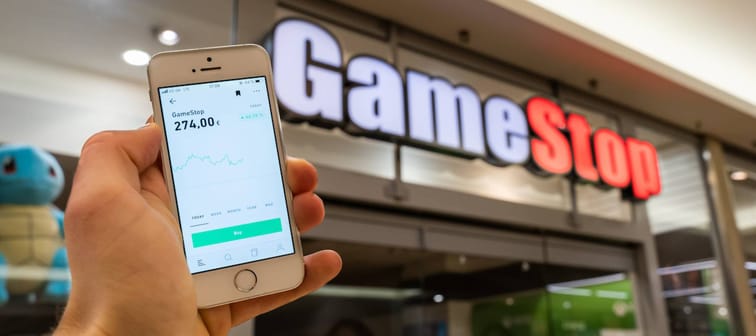The short version
- Meme stocks are shares of companies that go viral, resulting in a sudden price increase.
- Meme stocks arose in 2020 from the subreddit group r/wallstreetbets and have become popular among retail investors since then.
- GameStop was one of the first meme stocks, skyrocketing for a few short months before prices declined again.
- While some make money investing in meme stocks, it is very risky.
Meet Your Retirement Goals Effortlessly
The road to retirement may seem long, but with WiserAdvisor, you can find a trusted partner to guide you every step of the way
WiserAdvisor matches you with vetted financial advisors that offer personalized advice to help you to make the right choices, invest wisely, and secure the retirement you've always dreamed of. Start planning early, and get your retirement mapped out today.
Get StartedWhat are meme stocks?
When shares of a company drastically increase in price because of the viral influence of online retail investors, it's called a meme stock. Many of these stocks rise to prominence through Reddit and social media platforms. They are often considered overvalued by experts.
GameStop was one of the first meme stocks. YouTube personality Roaring Kitty posted a viral video on why video game retailer GameStop could skyrocket from $5 to $50 a share.
https://youtu.be/alntJzg0Um4
A few days later, Ryan Cohen, former CEO of Chewy.com, purchased an unknown amount of GME stock. He later joined the board, rapidly increasing the value of GME. The stock price went up so much that the Securities and Exchange Commission issued an investor alert on the risks of investing in stock based on social media. Some hedge funds suffered financial losses, and some were forced to shut down.
However, the stock quickly plummeted a few months later as investors lost interest. This YOLO investing strategy cost some investors hundreds of thousands of dollars, while others made millions.
 Price chart movement of GameStop stock from September 2020 to July 2022. Source: Yahoo Finance.
Price chart movement of GameStop stock from September 2020 to July 2022. Source: Yahoo Finance.
Meme stock example
GameStop is perhaps the most well-known meme stock, but there are others, such as Blackberry, Bed Bath & Beyond, and Nokia, and we are likely to see more in the coming years.
AMC, for example, spiked nearly 70% in early August before plummeting just a few weeks later amid overall economic concerns and rising interest rates. It rose along with GameStop in early 2021. After its more recent rise, the company rewarded shareholders with an AMC Preferred Equity unit listed on the New York Stock Exchange under the ticker APE. This is a reference to what hardcore meme stock investors call themselves on Reddit (apes).
Stop overpaying for home insurance
Home insurance is an essential expense – one that can often be pricey. You can lower your monthly recurring expenses by finding a more economical alternative for home insurance.
SmartFinancial can help you do just that. SmartFinancial’s online marketplace of vetted home insurance providers allows you to quickly shop around for rates from the country’s top insurance companies, and ensure you’re paying the lowest price possible for your home insurance.
Explore better ratesHow meme stocks work
Meme stocks aren’t necessarily valuable. Online communities, like the Reddit forum WallStreetBets, will coordinate buying and selling to manipulate the stock price for no other reason than social value. If enough supporters join, the stock price might increase dramatically, in spite of the company's actual worth.
One of the reasons there is widespread support for meme stocks is that these retail investors like to target hedge funds that have short positions in these companies. Hedge funds are pools of money from wealthy investors. Some of the fund mangers will short-sell stock, meaning they borrow shares from a broker and then sell them, hoping the stock price will fall. If the price rises, the investor is responsible for paying the difference.
Hedge fund investors who shorted meme stocks like GameStop found themselves footing the price difference. It cost them millions of dollars to buy back their short positions.
What is a meme stock ETF?
There are a couple of meme stock ETFs for investors who prefer to invest in exchange traded funds or ETFs. These funds allow investors to invest in various stocks instead of just one or two. While these ETFs hold meme stocks, they also often include stocks that wouldn’t be considered meme stocks, such as Apple or Tesla.
For example, the Roundhill ETF (MEME) offers exposure to 25 meme stock holdings, including AMC and Robinhood, while the SoFi Social 50 ETF (SFYF) is composed of the 50 most widely held U.S. listed stocks. That includes meme stocks like GameStop, AMC, Apple, Tesla, and Nvidia.
ETFs are diversified and may come with less risk than holding one stock. However, they are still composed of high-risk investments, so the value of the ETF is just as likely to plummet as it is to skyrocket.
Meme stock vocabulary
The financial world is full of specific vocabulary or jargon, and meme stock investing is no different. Bookmark this page if you want to stay on top of the latest meme stock happenings.
Apes: ?What people in the meme stock community call themselves. The term's origin is unclear but is either a reference to the movie Rise of the Planet of the Apes or the idea of banding together as so-called dumb apes to take on Wall Street.
BTFD: An abbreviation for “buy the f***ing dip” or going long on a stock after the price has declined.
Diamond hands: Holding onto a stock despite heavy losses.
Paper hands: A slur against those who sell their shares quickly and don’t maintain diamond hands.
To the moon: This means that the stock is rising drastically, with no foreseeable limit.
Tendies: Short for chicken tenders, the term refers to profits made on meme stocks.
The risks of meme stock investing
Many investors benefit from investing in meme stocks. The companies have also benefitted, using the meme stock interest to create secondary offerings on the stock market.
But not everyone is so lucky.
Many meme stocks eventually fall back to their pre-meme prices. There are some that have stayed elevated, albeit at a lower price than their all-time highs.
Those who got into the meme stock frenzy late lost money when the prices plummeted. Meme stock investing is a short-term strategy; it's essentially speculative investing.
Meme stock investing only works if many investors get in early on, so you must stay on top of social media investing trends. Because meme stocks don’t trade based on any fundamental analysis, prices might suddenly reverse.
The bottom line
The price movements of meme stocks are unpredictable and buying them is a very risky investing strategy. While some people can make money from meme stocks, many others may lose money.
If you’re interested in meme stock trading, it’s essential to do your research on the stock you're looking to buy. You need to understand that the price could decline at any time. Many experts agree that investing all your money in one asset is not a good idea, so consider having a diversified portfolio regardless of what you choose to invest in.
While the social aspect of meme stock investing is appealing, getting your financial advice from social media is often a dangerous move, especially if you're a beginner investor. Make sure to consult a fiduciary financial advisor before investing any significant amount of money, no matter how viral an investing trend may be.
Further reading:
- How to find legitimate investing advice on social media
- Best short-term investment strategies
- How to determine your risk tolerance
Sponsored
Follow These Steps if you Want to Retire Early
Secure your financial future with a tailored plan to maximize investments, navigate taxes, and retire comfortably.
Zoe Financial is an online platform that can match you with a network of vetted fiduciary advisors who are evaluated based on their credentials, education, experience, and pricing. The best part? - there is no fee to find an advisor.










